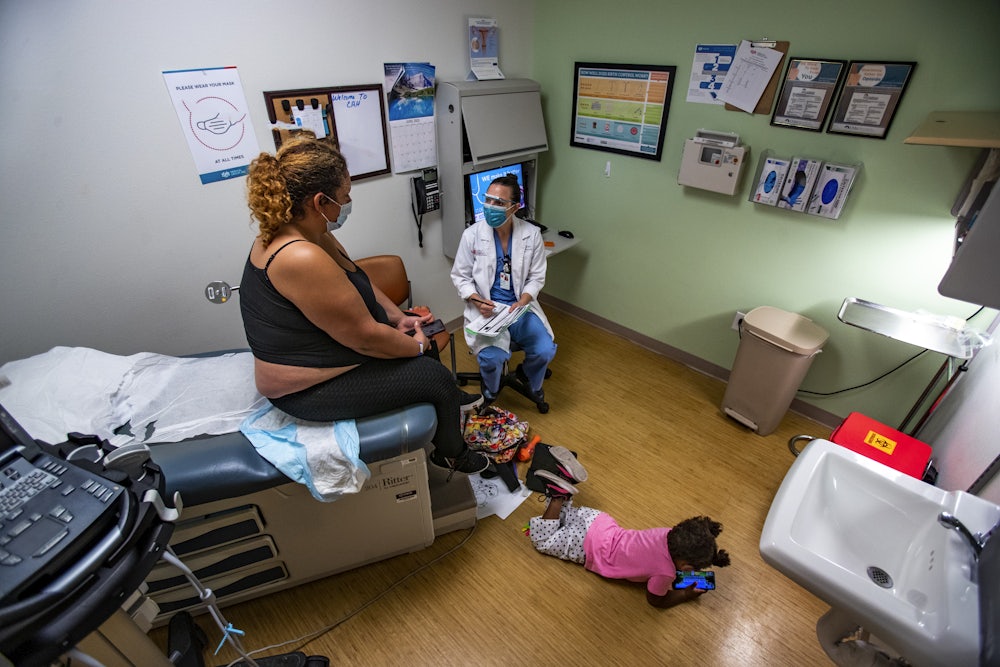Mifepristone, a drug regularly used in medication abortion, remains available after the Supreme Court last week blocked lower court decisions restricting its use. But a potential future ban on the drug won’t just affect pregnant people who want to end their pregnancies—it will also affect those who are losing their pregnancy through no choice of their own.
That’s because mifepristone, despite being popularly known as an abortion pill, is also often used to manage miscarriages.
“Beyond abortion care, this is a medication that’s helpful for women that are going through the worst times of their lives, if they’ve been diagnosed with an early miscarriage or a late stillbirth,” said Dr. Hayley Miller, a fellow in the Maternal-Fetal Medicine and Obstetrics Division at Stanford University. As with abortions, the drug is often used along with the misoprostol, she explained, which “avoids the need for a surgical intervention.”
Most miscarriages occur within the first trimester, before the twelfth week of pregnancy. A 2018 study found that treating a pregnancy loss in the first trimester with mifepristone and misoprostol resulted in “a higher likelihood of successful management” than with misoprostol alone. Around 84 percent of women experienced “complete expulsion” if they had been treated with the two-drug regimen, compared to around 67 percent for those who had only been treated with misoprostol. Another 2020 analysis found that the two-drug regimen was also more effective in managing so-called missed miscarriage, which occurs when a fetus stops developing or dies in the womb without any signs or symptoms.
“Mifepristone can help make the miscarriage process quicker, minimize the risk of needing further treatment, and make the process more comfortable for patients,” said Dr. Nisha Verma, a fellow at the American College of Obstetrics and Gynecology and an ob-gyn in Georgia. Although mifepristone is often used earlier in the first trimester, particularly for medication abortion or early miscarriages, it also can be used “for patients that experience a fetal demise later in pregnancy, when combined with misoprostol,” Verma said. She added that the two drugs can “allow patients to manage their miscarriage in the comfort and privacy of their own homes,” and help decrease the likelihood of side effects like nausea, vomiting, and diarrhea.
In October, more than 40 medical and advocacy groups petitioned the FDA asking for miscarriage management to be added to the label for mifepristone as one of its uses. The FDA rejected the petition in January, saying that the drug’s manufacturer, Danco Laboratories, needed to submit an application requesting a change to the labeling. The following month, a group of senators sent a letter to Danco Laboratories asking the company to submit an application to that effect.
Abigail Long, the director of marketing and public affairs at Danco, told me that changing the label is “definitely something that we would give strong consideration to,” depending on the outcome of the ongoing cases. “We recognize how important miscarriage management is and are very much aware of the role that mifepristone plays in helping to treat people that are experiencing miscarriages,” Long said in an interview earlier this month, prior to the Supreme Court’s latest action. Long added that “we can’t move forward on anything unless we have the appropriate data to do so,” explaining that such an update would require “looking at everything that’s out there, analyzing it, determining if it’s of the quality and robustness that we would need to support a change in the label.”
Kirsten Moore, the director of the Expanding Medication Abortion Access Project, one of the groups that led the petition to the FDA, expressed “disappointment” with the agency’s denial. “If Danco’s approval of mifepristone for medication abortion goes away, and by extension GenBioPro’s approval for their generic product goes away, I would hope that a drug manufacturer would step in right away to start getting mifepristone for miscarriage onto the market as its own drug,” Moore told me. GenBioPro, the company that makes the generic version of mifepristone, is suing the FDA to block it from complying if courts rule that the drug should be removed from the market.
Mifepristone blocks the receptors of progesterone, a hormone that suppresses contractions during pregnancy and helps avoid preterm labor. By blocking the receptors, mifepristone softens and dilates the cervix without increasing uterine contractions, assisting the uterus to evacuate the pregnancy. Some research conducted outside of the United States has also found that mifepristone could assist in labor induction when a pregnancy reaches term, at around 39 or 40 weeks.
“This has been shown, compared to placebos, to reduce the overall risk of cesarean section and overall reduction of time in labor,” said Miller, who is one of the lead researchers in an ongoing clinical trial exploring the use of mifepristone to induce labor for term pregnancies, the first of its kind in the U.S. Although the results of this study will be published this summer, Miller noted that “there’ve been thousands of women enrolled in [previous] studies that use mifepristone for term induction of labor with no adverse effects.”
It remains unclear how long mifepristone will be available. The Supreme Court’s decision last week came after a whirlwind of rulings. Matthew Kacsmaryk, a district court judge in Texas, had ruled that the FDA had improperly approved mifepristone two decades ago, but another district court judge in Washington state issued a conflicting ruling just moments later. The following week, the Fifth Circuit Court of Appeals partially blocked Kacsmaryk’s ruling, stating that mifepristone could be used for up to seven weeks in pregnancy in states where abortion is legal (even though the FDA had approved the drug for up to 10 weeks). The appeals court also blocked FDA rules aimed at easing access to the medication, such as allowing abortion drugs to be sent through the mail and prescribed by providers who are not doctors.
The Supreme Court froze the lower court rulings while the case is under consideration in the Fifth Circuit, with only two justices dissenting. Oral arguments in the case begin in May. The eventual ruling by the Fifth Circuit court will likely be appealed to the Supreme Court.
The coalition that has challenged the FDA approval of mifepristone argues that the drug is not necessary for miscarriage management. “The outcome of this lawsuit will not impact women’s ability to receive treatment for miscarriages. For decades, physicians have successfully treated miscarriage with misoprostol and D&C procedures; these options will remain available regardless of the ruling on this case,” said Dr. Donna Harrison, a board-certified ob-gyn and the chair of the Alliance for Hippocratic Medicine, in a statement. Harrison also noted that prescribers require certification to dispense mifepristone, adding: “The majority of physicians are able to treat miscarriage patients quite well without ever using mifepristone.”
Indeed, some providers in states that restrict abortion care already only prescribe misoprostol for miscarriages, although research shows it works less well on its own than with mifepristone. But Miller argued that it was “nonsensical” to rely on misoprostol only when it is “not as effective and not as safe as the two medications combined.”
“It’s just scary to think that we have a group of people who think that women don’t deserve a safer opportunity for their pregnancy management,” Miller said.






